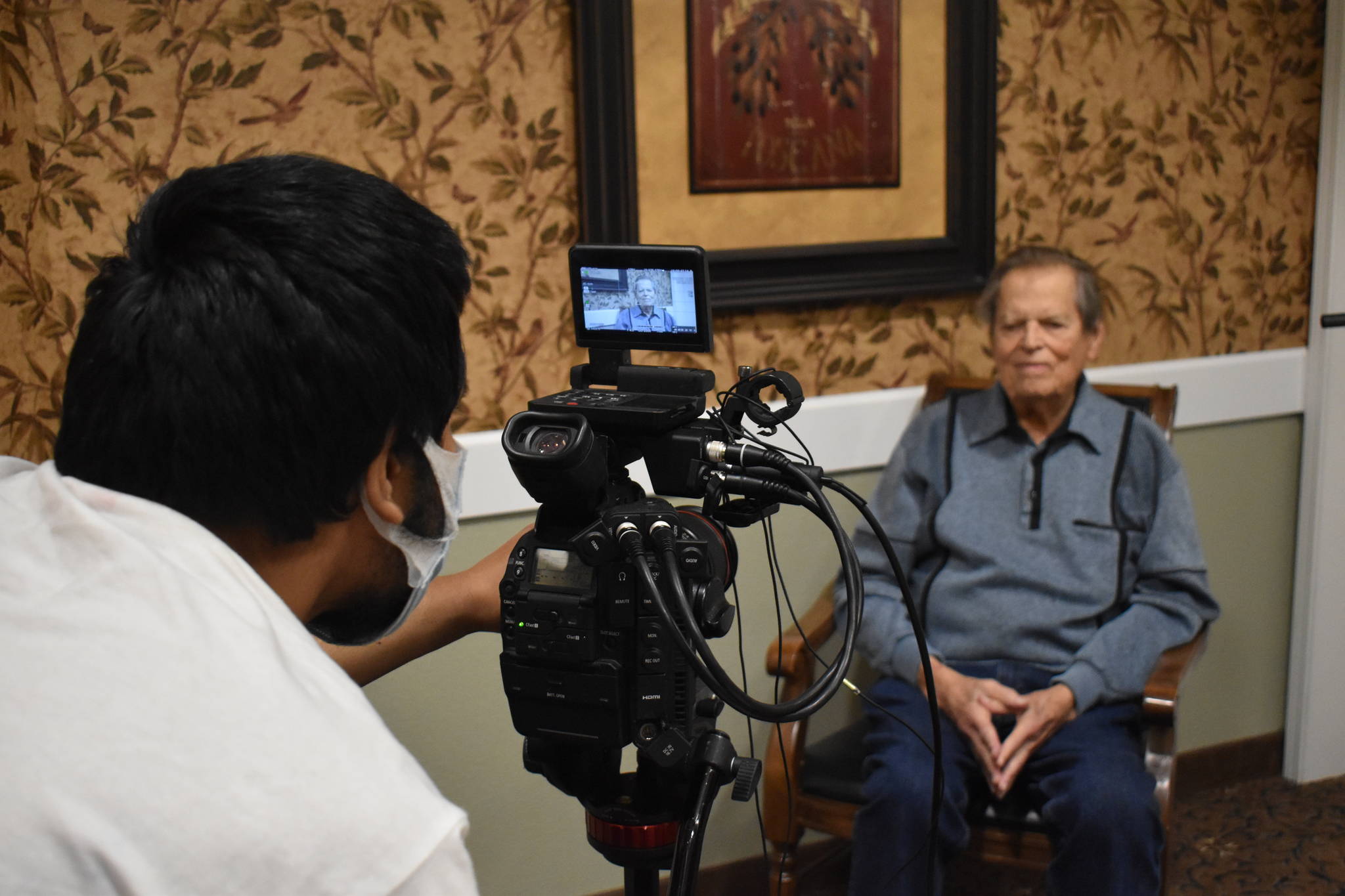Rishi Sharma believes men like World War II veteran Frank Burns made it possible for him to be alive today.
Sharma, 23, recently interviewed Burns at his retirement community in Freeland.
Burns served in the 42nd Infantry “Rainbow” Division of the U.S. Army during the war and was one of the first boots on the ground when troops liberated prisoners from the Nazi concentration camp Dachau on April 29, 1945.
Burns recalled the camp’s tall walls and standing guard outside the gate of the camp while others walked through. He once saw a glimpse of a train filled with the corpses of the Nazi’s victims.
Listening intently behind the camera, the the young traveling interviewer, who runs the nonprofit Heroes of the Second World War, has met more than 1,100 World War II combat veterans as part of his mission to document their oral histories before they are all gone.
According to Department of Veterans Affairs statistics, just 325,574 of the 16 million Americans who served in World War II were alive in 2020.
Sharma learned about Burns after setting up an interview with another Whidbey World War II veteran, Web Halvorsen.
Sharma records the interview on video and then gives the veteran and his family copies for free. He also posts videos to YouTube for the public to learn their stories.
Sharma has interviewed veterans since he was a high school student in Agoura Hills, Calif. He asks them about where they were when they learned about the bombing at Pearl Harbor, what basic training was like, the kind of weapons they carried and what it was like to return home.
“They know their stories,” Sharma said. “I’m just there to lead them through their reflections.”
His story rose to national attention in 2016 when CBS News aired a segment on his work. His fundraiser took off and reached more than $200,000. After that, he hit the road.
He said he hasn’t been home in four years, although he has seen his mother during that time. He’s traveled to 45 states and several countries to learn about men and women’s sacrifices made in combat.
Sharma said he’s always been fascinated by the notion of a 17- or 18-year-old putting their lives on hold to fight for a cause bigger than themselves.
“It’s hard for me to put in words but, basically, I’ve always been into World War II,” Sharma began.
“There’s something so noble about the idea that these young men, 17-24-years old, roughly, were willing to put their whole lives on hold, a lot of them forever, to go take part in something larger than themselves not knowing the outcome but just knowing that it was the right thing to do.”
He said he thinks the war was the last of its kind, not only because of the proliferation of nuclear weapons since then but for the moral reasons of the war.
“In the current world we live in, it’s such a faraway idea people doing things for no other reason than it’s just the right thing to do — not for glory, not for monetary gain — just to do it,” he said.
Others have joined his effort by interviewing veterans in their communities, but Sharma is alone on the road. He has continued his work during the pandemic, although he had to stop for a time, and wears two masks, and is tested regularly for COVID-19. Luckily, many of the veterans he interviews have been vaccinated by now.
Sharma said he has been talking with some television networks in hopes that he can reach more veterans. He can see his work going for 10 more years.
“I don’t want to keep being this raggedy guy, because that’s kind of lonely. I know that there’s more I could be doing,” he said.
His life on the road can indeed be a little rough. In fact, Sharma said he slept in his car before Burns’s interview because a hotel room would have cost him about $150 for one night.
“I wouldn’t be doing it if I didn’t think how meaningful it is,” Sharma said. “I literally feel like the World War II veterans have saved my life.”
Sharma’s parents immigrated from India. He said he believes his ancestors would not have survived if the Allies hadn’t been successful.
“So I genuinely believe not only am I alive because of these veterans, but I get to live in a country in the Western world where I can achieve anything, and it’s because of them,” he explained.
“I feel like everything I’m doing is a small way of saying thank you.”
• If you know of a combat veteran from World War II who would like to be interviewed, call Sharma at 202-315-8743. For more information visit heroesofthesecondworldwar.org



